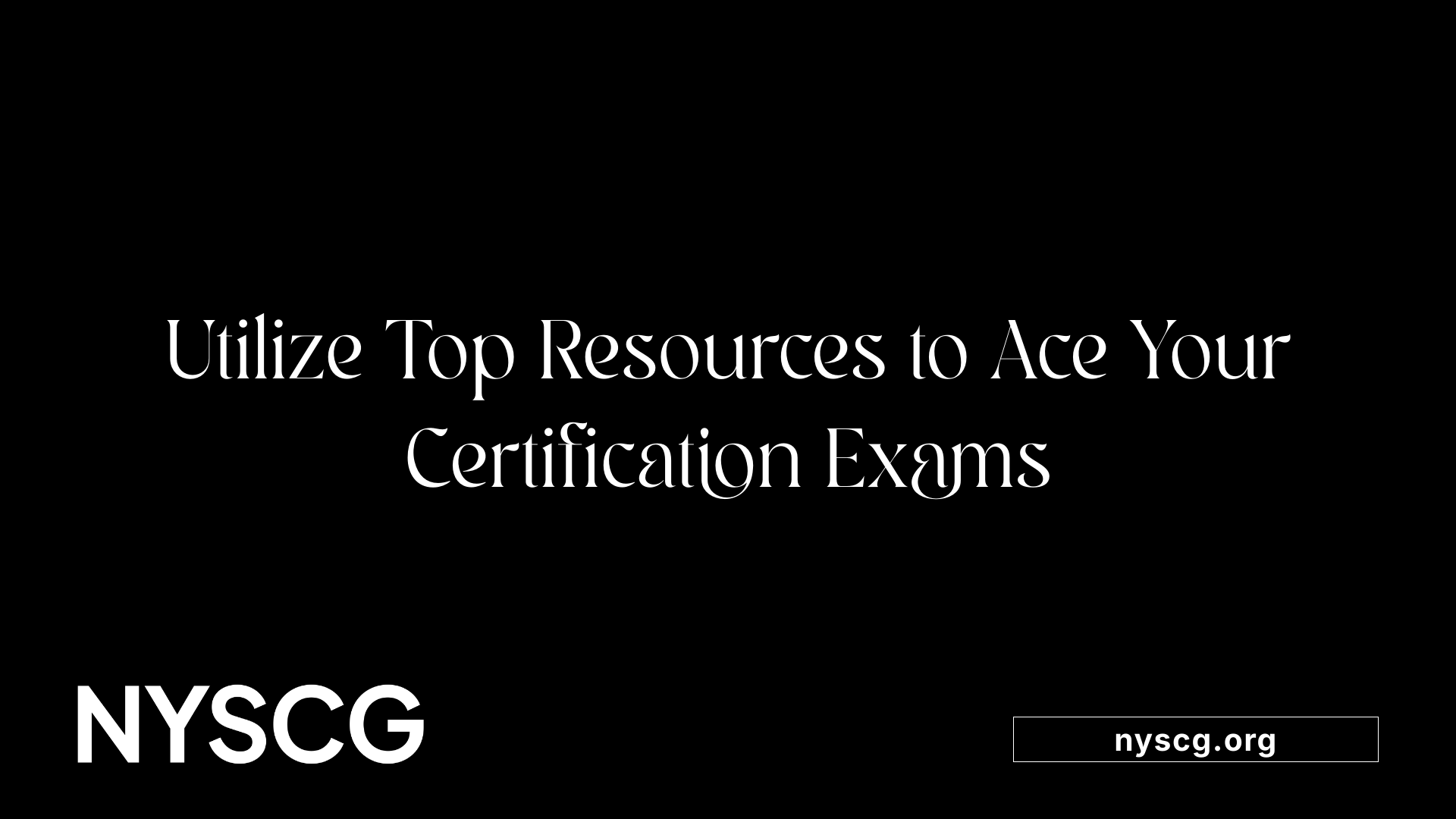Preparing for the Chaplain Credentialing Exam: Study Tips & Resources


Embarking on the path to chaplain credentialing requires thorough preparation, understanding of standards, and strategic study methods. This guide provides comprehensive tips, resources, and insights to help candidates navigate the certification process effectively, ensuring they meet the professional and ethical standards necessary for delivering quality spiritual care across diverse settings.

The process of credentialing chaplains is governed by comprehensive standards set by organizations such as the Society for Clergy (SCA), the International Fellowship of Chaplains (I.F.O.C.), and the National Association of Catholic Chaplains (NACC). These guidelines are rooted in core ethical principles outlined in foundational documents like the Common Code of Ethics, ensuring that chaplains maintain integrity, professionalism, and respect for all individuals.
Educational requirements form a crucial part of the credentialing process. Candidates typically need to complete coursework from accredited educational institutions. A common prerequisite is experience in Clinical Pastoral Education (CPE), which provides supervised, hands-on training in real-world healthcare or community settings. The standards specify a minimum number of clinical hours and pastoral care experiences required to demonstrate competence.
Candidates are assessed through various evaluations, including interviews, written exams, and standardized patient scenarios to confirm their skills and readiness. Recommendations from supervisors and verification of pastoral experience also support credentialing decisions.
In addition to educational and experiential criteria, ecclesiastical endorsement from recognized faith groups is usually required. This endorsement certifies that the individual adheres to the theological and moral standards of their faith tradition.
Ongoing professional development is emphasized to ensure chaplains uphold high standards throughout their careers. This may include continuing education, renewal of certifications every few years, and participation in professional improvement activities. Many credentialing bodies also promote reciprocity agreements, enabling chaplains certified by one organization to be recognized by others.
Overall, these standards serve to maintain a high level of quality and accountability in spiritual care, ensuring chaplains remain ethical, skilled, and committed throughout their professional journey.
| Aspect | Details | Notes |
|---|---|---|
| Ethical Standards | Grounded in documents like the Common Code of Ethics | Promotes integrity and respect in care |
| Educational Requirements | Accredited degrees, CPE, pastoral experience | Varies by certifying organization |
| Clinical Training | Minimum hours, supervised internships | Crucial for hands-on skill development |
| Certification Exams | Bible Knowledge, Doctrine, and Polity standards | Focus on scriptural, doctrinal, and governance knowledge |
| Ongoing Development | Continuing education, recertification every 5 years | Ensures skills and knowledge remain current |
By adhering to these guidelines, chaplains can ensure their practice meets professional and ethical standards, thus providing compassionate, competent spiritual care in diverse settings.

Preparing for the chaplain credentialing exams requires a structured approach and thorough understanding of the exam content. Developing a detailed study schedule that aligns with the official outline helps ensure comprehensive coverage of essential topics. These include spiritual assessment, cultural competence, ethical considerations, and grief support.
Reviewing sample questions and taking practice exams or mock tests allows candidates to familiarize themselves with the test format. This practice helps identify areas where further review is needed, reducing test anxiety and increasing confidence.
Utilizing official resources, such as the courses and study guides provided by the Spiritual Care Association, enhances understanding of core competencies. These resources are designed to mirror the exam's content and focus.
Engaging in collaborative learning through study groups can be especially beneficial. Discussing concepts and sharing insights with peers offers additional perspectives and clarifies difficult topics.
In addition, practicing stress management techniques—including mindfulness, deep breathing exercises, and adequate rest—can help maintain focus and improve performance during preparation and on test day.
Finally, it is essential to ensure all credentialing prerequisites—such as clinical pastoral education hours, educational credentials, and endorsement documentation—are completed and well-organized. This preparation supports overall readiness and success.
| Study Tip | Description | Purpose |
|---|---|---|
| Develop a study schedule | Plan study sessions aligned with the exam outline | Covers all topics systematically |
| Review sample questions | Practice with questions similar to those on the test | Familiarizes with question format and content |
| Practice mock exams | Timed simulations of the actual exam | Builds confidence and time management skills |
| Join study groups | Collaborate with peers for shared learning | Offers diverse insights and mutual accountability |
| Use stress management tools | Incorporate relaxation and mindfulness techniques | Reduces anxiety and improves focus |
For more detailed tips, searching "study tips for chaplain credential exams" online can provide additional tailored strategies and resources to enhance your preparation.
 When preparing for the standardized clinical knowledge test required for chaplain certification, several resources are available to aid candidates in their study efforts.
When preparing for the standardized clinical knowledge test required for chaplain certification, several resources are available to aid candidates in their study efforts.
Firstly, candidates can access official sample questions and practice exams. These tools serve as valuable resources for understanding the format and types of questions that will appear on the test. Familiarity with these questions helps reduce anxiety and increases confidence.
Core texts play a crucial role in deepening understanding of essential topics. Recommended books such as 'Making Health Care Whole' by Puchalski and Ferrell and the guidelines from the 'National Consensus Project for Quality Palliative Care' provide comprehensive insights into evidence-based practices, ethical issues, scope of practice, and cultural competence.
To keep organized, candidates can utilize study checklists and detailed guides offered through various certification websites. These materials help ensure that all necessary topics and requirements are covered before taking the exam.
Beyond books and checklists, a range of scholarly articles and guidelines from reputable healthcare and chaplaincy organizations are available online. These publications often cover standards related to chaplaincy, clinical pastoral education (CPE), and quality care.
Additionally, participating in webinars and online courses can enhance understanding of core competencies and best practices. Many organizations provide these educational opportunities to support ongoing professional development.
Overall, these resources, developed based on established standards, form a comprehensive toolkit for candidates. They help foster thorough preparation, align learning with professional expectations, and increase the likelihood of success in certification exams.
| Resource Type | Examples | Purpose |
|---|---|---|
| Sample questions & practice exams | Practice sets by certifying bodies | Familiarize with exam structure and question formats |
| Books & core texts | 'Making Health Care Whole', NPPC guidelines | Gain in-depth knowledge of critical topics |
| Study checklists & guides | Certification websites | Organize prep and ensure all areas are addressed |
| Scholarly articles & guidelines | Healthcare and chaplaincy research articles | Stay updated on standards and best practices |
| Webinars & online courses | Certification preparation programs | Enhance understanding of core competencies |
Becoming a licensed or credentialed chaplain generally involves a combination of formal education, supervised clinical training, and professional experience. Most pathways begin with earning at least a bachelor’s degree in a relevant field such as religious studies, theology, psychology, or counseling. Many candidates go further by pursuing a graduate degree, with the Master of Divinity (MDiv) being the standard requirement for many chaplaincy roles. Calvin Theological Seminary and other accredited institutions offer MDiv programs that prepare students through coursework like spiritual care, pastoral ministry, and interfaith competence.
In addition to academic qualifications, completing clinical pastoral education (CPE) is essential. CPE involves supervised training in real healthcare or community settings, providing hands-on experience in spiritual care. Typically, candidates must complete a minimum of four units of CPE from accredited training centers, accumulating about 1,000 to 2,000 hours of direct patient or client contact.
Practical experience is equally important. Prospective chaplains often spend one to two years in diverse work environments such as hospitals, military bases, prisons, or community organizations. This experience ensures they develop the skills necessary for crisis management, deep listening, and providing spiritual support.
Moreover, candidates need to obtain endorsement or endorsement-like documentation from their faith group or religious denomination, which affirms their suitability for ministry work. While this endorsement may not be obligatory for all certification bodies, it is generally required for candidates seeking certification as a Board Certified Chaplain or Credentialed Chaplain.
Finally, the certification process involves assessments, interviews, and examination of competencies related to spiritual care, ethics, cultural competence, and professional standards. Successful completion of these requirements ensures that candidates are fully prepared to serve as competent, ethical, and compassionate chaplains across various settings.
The pathway to becoming a certified chaplain involves a structured process that verifies educational background, clinical experience, and professional competence. Candidates typically need a bachelor’s degree in biblical or religious studies, followed by a graduate degree such as a Master of Divinity or a related field from an accredited institution. Completing specialized clinical training, including Clinical Pastoral Education (CPE) units, is also essential.
Applicants must secure endorsement from a recognized faith group and accumulate at least 2,000 hours of chaplaincy work in relevant settings such as hospitals, hospices, or military environments. The process begins with submitting an online application through the certification organization’s portal, which is then reviewed by a certification committee.
An interview may be required to assess a candidate’s readiness and adherence to professional competencies. Certification bodies like the Board of Chaplaincy Certification Inc. (BCCI), the National Association of Catholic Chaplains (NACC), and the Spiritual Care Association (SCA) follow strict policies to ensure ongoing professional standards.
Certification is typically valid for five years. To maintain credentials, chaplains must participate in continuous education, submit renewal applications, and uphold ethical guidelines. These policies promote continuous improvement, accountability, and the integrity of spiritual care practice. It also includes provisions for appeals and ethical violations, ensuring fairness throughout the certification lifecycle.
Adhering to these policies and standards guarantees that chaplains provide competent, ethical, and culturally sensitive spiritual care that aligns with recognized professional benchmarks.
Preparing for chaplain credentialing exams requires a thoughtful approach that combines effective study methods with stress management techniques. Developing a detailed study plan helps break down extensive material into manageable sections, making consistent progress easier. Use calendars or planners to set deadlines and track your study milestones.
Familiarize yourself with the exam format through sample questions and practice tests. Regular practice not only boosts confidence but also improves your familiarity with the types of questions asked. To stay calm and focused, incorporate relaxation practices such as deep breathing, meditation, or mindfulness exercises into your daily routine.
Maintaining good physical health supports mental clarity. Prioritize balanced nutrition, adequate sleep, and regular physical activity. During study sessions, take short breaks to prevent burnout and keep your mind fresh.
Building resilience involves nurturing mental, physical, social, and spiritual well-being. This holistic approach helps you stay balanced and prepared for the exam.
On test day, arrive early, organize your materials, and adopt strategies such as answering easier questions first to build confidence. Staying positive and focused throughout the exam is essential for success.
Overall, combining structured planning, stress management, and self-care creates a solid foundation for achieving your certification goals.
Preparing for the chaplain credentialing exam involves understanding the standards, engaging in strategic study, utilizing quality resources, following a clear educational pathway, and implementing practical exam-day strategies. By combining these approaches, candidates can enhance their confidence and ensure they meet the professional standards required to serve as qualified chaplains in diverse settings. Continuous professional development and adherence to ethical practices remain essential throughout one's career in spiritual care.
All you need is the will to make the world a better place.
New York State chaplain group inc. is a tax deductible organization with a federal tax Id number 92-383-4921